If you have a unique skill or have cracked the code on running a successful business, sharing your heart and wisdom with others can provide you with an expanded product offering and generate a lucrative income stream. The main hurdle is finding a simple and scalable way to monetize your knowledge. If only there was a solution.
Enter Jonathan Cronstedt or JCron, as he prefers to go by, our guest for today’s episode number 197. He’s the president of Kajabi, an online platform designed for the digital education entrepreneur, that simplifies the process of creating marketing and selling digital products, like courses, and in the process generating millions of dollars of revenue for its users. Prior to working at Kajabi, JCron was the general manager of Digital Learning Systems at Success Magazine and the CEO of DigitalMarketer.
Get ready to learn what it takes to produce a profitable course, host your own events, and even start your own mastermind group. If you’re an expert looking to diversify your revenue streams, or if you’re just passionate to share what you know, this episode is packed with insider tips on how to leverage the eLearning boom.
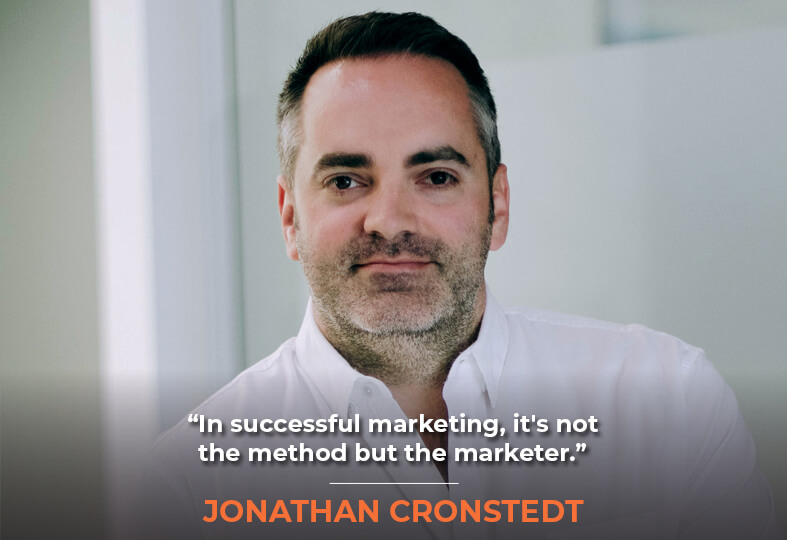
Transcript
JCron, it’s so great to have you on the show.
Great to be here, Stephan. Thanks for having me.
First of all, I’m guessing that a number of our listeners are not familiar with Kajabi. So, let’s tell them at least what the heck Kajabi is, kind of an unusual name. I’ve met Andy Jenkins before at a lake retreat, so I know he’s the founder. What the heck is Kajabi?
Believe it or not, Stephan, Andy actually has not been part of Kajabi for roughly nine years. Andy was one of the original three founders. Then he was bought out about a year into the business very amicably. We’re still friends to this day and he’s been a dear friend of mine for over a decade. But yeah, that was a while ago. Right now, the company’s CEO and co-founder, Kenny Rueter, is the fearless leader and I am President, partner, and all that fun stuff, but it’s pretty much the two of us.
He’s the CEO and you’re the President. Is the President role a figurehead or it’s like the Vice-President in the United States or are you in the bowels of the organization making sure it actually works?
Oh no. It’d be wonderful to just a figurehead position to bridge the gaps in the party because that would be awesome. But no. I would say our breakdown is very much we co-lead in a lot of different areas. Obviously, Kenny is the CEO and he’s going to be the one that if it must go left, we’re going left. I would probably say that we have a lot of different areas of emphasis in where we focus. Kenny is definitely very product-driven. His technology knowledge is far outpacing mine. I gravitate more towards the marketing, customer success, and operations side of the business. So definitely a division of labor between the two of us and that’s how we’ve structured it.
Tell us more about Kajabi. Is it a webinar platform? Is it a learning management system? Is it both? Is it something else? What is it?
Kajabi is best described as empowering entrepreneurs, experts, and influencers. Essentially, when you’re serious about growing an online business, Kajabi is the platform that’s going to power it. Our primary audience is going to be digital education entrepreneurs, individuals that are participating in some form of whether it be premium content, coaching, or consulting – anything that can be delivered digitally is right now on our platform. We’re seeing more and more applications, even in physical products on our platform. But the way that I would best describe it is, it’s like Shopify is to physical products as we are to digital products. If a learning management system and a marketing automation system had a baby, it would be Kajabi.
Very nice, and I have not heard that term before, digital education entrepreneurs. I’ve heard of info-marketers or information marketing but is that a term that you guys coined? Or is that industry term? Where’s that come from digital education entrepreneurs?
It’s really just a term that I coined. I don’t know where I picked it up or if anybody else has ever used it, but I think that information marketer is something that is a bit antiquated. It really stems from GKIC, which was part of my career in the past as well where information marketers traditionally have a business that they then teach people how to succeed in that business and that’s information marketing.
So I’m a dry cleaner. I’ve got a unique way of marketing my dry cleaning business. I box it up and sell it to dry cleaners around the United States. That’s going to be a very different business-in-a-box approach than someone who might be a pilates instructor teaching pilates but doing so online rather than in a studio. It’s more than the education, the business is not necessarily bolted on to an existing business.
Okay, so education is the business. Can you give us an example of a business, maybe a client that was able to perhaps transform their physical location, not very scalable business to something that was purely online and digital education?
Sure. One of my favorite stories is Greg Todd. Greg Todd is one of our Kajabi superheroes, which means he’s earned seven figures and beyond on the platform. He has basically built a business serving physical therapists. If you think about physical therapy, it’s one of the most location- and time- constraint positions you can have because you’re only being paid when you’re conducting physical therapy in a facility. So you’re going to be limited by your hours and by your facility size.
In successful marketing, it's not the method but the marketer. Share on XAs Greg grew his physical therapy practice, he realized that not only had he developed a lot of unique ways of building physical therapy practices, but also a lot of ancillary businesses around it. The issue that he was experiencing was he ran out of hours in the day and ran out of space in his facility. So, he brought those physical therapy methodologies online and has courses that are teaching physical therapists all of the ways that he grew his physical therapy business. He’s now got live events, components, coaching and consulting component, all of the areas that have now grown his business. From what was geographically constrained, now delivering it digitally.
There are other individuals. I forget the gentleman’s name; it starts with T. I’m probably going to remember it, but he was a fitness instructor primarily working with individuals that were staying fit in their 50s, 60s, 70s. So, more of a lifestyle, mobility fitness. He actually had a surgery that he was no longer able to really do classes in the traditional sense, teaching 4–6 classes a day. He moved his entire physical fitness business online, let go of the location entirely, and now has a business that he can run from anywhere.
Another one that is also a great application of what I would call not retiring but rewiring perspective would be Frank. Frank was a fire department chief who primarily interviewed firefighters. That was his job. He retired from the fire department. He and his wife love motorcycle riding, so he started a business on Kajabi, actually teaching, training, and equipping firefighter aspirations for people to prepare for the interview process to become a firefighter.
Literally, a business that came out of his job of interviewing firefighters now teaching people how to ace their firefighter interview. He and his wife drive their motorcycle all around the United States, plugin wherever hotel or motel they’re at for the night. He does his coaching calls, hops on answers emails, hops on his Facebook group, and that’s his entire business. There’s really no limit to the application of either: (a) transitioning the business entirely from bricks and mortar to a digital application, or (b) having a brick and mortar business that’s successful and then amplifying it through all of the digital means that Kajabi can offer.

Very cool. So, when a client develops an online coaching offering, is it typically group coaching or do they do a lot of one-on-one coaching, which isn’t as scalable obviously or is it a combination of the two? What’s the sweet spot here and how would you recommend our listeners to apply this model?
It’s really going to be something where I think that it can be applied in a variety of ways. If you’re listening, there are essentially a few different paths that you could consider. If you’re right now looking for a business that you could start, there are innumerable opportunities serving passionate markets, whether it is around your hobbies or your career. Applying the knowledge or the passions that you have, there are lots of markets out there that you can serve, start a business from scratch, and begin as a digital education entrepreneur.
You can also look at your existing business and look at how to expand that through alternative revenue sources. If you are a consultant or if you are a practitioner of any kind, you have the ability to look at what you do. While you are continuing to do that in your role, you can also look at ways that you could apply that one-to-many. If you’re a consultant—you probably have a very high billable hour—or an attorney or a specialized practitioner, you could have a one-to-many approach by providing a digital course, that’s far less expensive, that can be selling 24 hours a day, seven days a week online, and expand your earning opportunities from your existing position.
Going back to that information marketing idea of if you’ve built a successful business, you can teach others how to build a business in that arena. That’s a great expansion revenue source. Certainly leveraging, even if it was just growing your current business, you could apply digital education, a really customer-centric focus, and change the experience entirely.
Let’s say you’re a female fashion retailer, a very challenging area right now with what Amazon’s doing to retail. You could easily create an immersive digital experience for everybody that came to your store. It might be makeup tips, it might be style tips, and what clothing looks best on what frame, what colors to wear for what season, and you could create this immersive digital experience that’s a value-add for a retail store. I really do mean it when I say there are limitless applications only limited by your creativity of how you can benefit from what this type of platform can bring to your business.
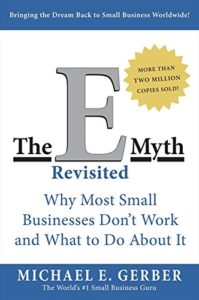
When you say platform, it’s really a system or a structure that allows the entrepreneur to scale their business. When I interviewed Michael Gerber, who is the author of The E-Myth, a phenomenal book about how to systematize your business and become truly an entrepreneur and not just have this entrepreneurial delusion. He recommends having this new systems-based approach with a completely new company. Even if you have a very successful existing business, don’t try to overhaul that. Instead, start a new entity—what he calls NewCo—and build it from the ground up with all those systems and structures in place.
I’m curious about your opinion on that because you just said you could do either. You could start with a new business or build it into your existing business. What’s your reaction to what I just described and Michael Gerber’s approach?
I don’t want to be the person to disagree with Michael Gerber. I do think that Michael Gerber wrote a great book, but I think that it’s a bit cavalier to assume that individuals with an existing enterprise have the bandwidth and availability of resources to begin anew, in a separate category, and be able to do both of them well. I would say it’s really going to depend on the business, that if you have the ability to really apply what you now know, start fresh, and not be constrained by any legacy issues, sure, that’s amazing. That’s the best way to do it. That’s the perfect way to do it because you’re going to be unencumbered. But I would more say that I would be seeking the 80/20 application of whatever new information or new processes in front of you, apply the 20% that will get you the 80% of the results, because the likelihood of starting fresh and having two masters to serve, to me, is just far too complicated.
I’m facing this dilemma myself right now with my company because I really want to overhaul my systems. I’m a big structure kind of guy. I’m really into the structure and so many ways that I can add more structure to my existing business and I’ve been doing that. But if I were to apply The E-Myth approach, I’m going to create this separate company, NewCo, and build all the systems and structures in that—I have resisted doing that so far—I guess I could think of this like a skunkworks sort of company that would maybe house some IP and would take some aspect of the business or create a new revenue stream or access a new channel. Today, I haven’t taken any action on that and still in the back of my head, I feel like I should be doing that anyway.
Again, that’s where the NewCo is far too great a cognitive burden. You’re a case study of why that is not the right way to do it because the demands of you restructuring an entirely new entity are far too great, whereas if you just took his in the business on the business process, divide out your time during the week for those activities, there’s definitely an item that you could apply, that you would see the gain, without needing to completely create a new entity.
I love your thoughts as a listener as to the applicability of Michael’s approach to your business. Now, JCron, you had described a few case examples like the physical therapist who became a trainer and expert to physical therapists on how to build and grow their business. I’m thinking of a similar model for my business, because why not? I can only scale myself so much doing SEO consulting. Even though I have some really fun clients, really interesting projects, and great brands to work with—I’ve worked with Chanel, Volvo, and Sony—it doesn’t scale. I can’t clone myself.
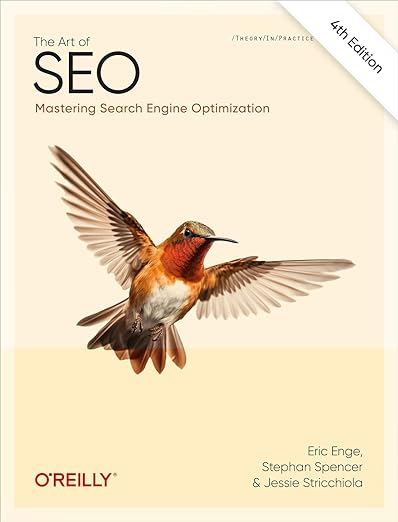
This is the entrepreneurial dilemma and one that you address with the Kajabi platform. How would you recommend I apply the approach and the platform to what I’m doing so that I can get more scalability in the SEO world? I’m a known expert, being co-authored The Art of SEO and so forth. I can leverage that and perhaps train and certify SEO practitioners. I could offer more group coaching. I do some coaching but it’s all one-to-one. Totally doesn’t scale and group coaching may be as part of an overall curriculum. They get some online video training and then they get some group coaching with me as well as part of the program. What would you recommend specifically for me, given my situation?
I would begin by thinking through what the inventory is that you could teach. Then I would find the inflection point of what you could teach and what you want to teach. Then I would overlay that with available markets. You might find that you’ve got a lot of resources in marketing. You’ve got a lot of resources in highly technical marketing, such as SEO. The question is, just from a personal passion perspective, where are you going to really enjoy remaining on the cutting edge? SEO changes. By the time I’ve had breakfast and then lunch, SEO rules have changed.
If you’re passionate about absorbing, consuming, and getting those out there, that might be a great fit. But if you’re looking for something that you’re going to build for scale, and doesn’t necessarily have the burden of perpetual updating, you might want to stick with the marketing concepts that have served you well over your career and teaching that. I think putting it through the lens of what is exciting and what your passions are, is going to be helpful. Not “I’m not a ‘follow your passion guy’” because you could follow your passion and end up broke, but I do think that having a passionate interest is definitely something that serves people well from the purpose of what they’re delivering.
Now, in addition to that, if you’ve got a marketing methodology that is differentiated and going to be helpful, but it’s certainly something that there are innumerable marketing arenas that you could speak to choose from. Let’s just say for the hypothetical, we choose marketing. I think you can benefit from the brands that you’ve served and really leverage that credibility into a marketing methodology that you can either teach people to apply to their business. So you have a business that is X and you want to take it to Y, I’m going to show you how to do that. That’s one market. The other market would be you are working with customers by teaching marketing, in some type of agency or a consultant. This is another toolset to have in your toolbox and I can teach you or certify you in this methodology. That would be another completely different approach. Each of those businesses would come with the do-it-yourself, done-with-you, done-for-you paths and all of the pieces that come with it.
When you teach a practitioner or an agency, an area that’s very specialized such as SEO, then you could provide certification and not just the training. There is some cachet with that for you as the certifier, and then for them as the one who’s been certified because it’s like you’ve given your stamp of approval, and they get to leverage that, which only is valuable if you have some authority positioning or some credibility in the marketplace already. You can’t just provide certification as Joe Schmo off the street, I think, but maybe I’m wrong. What’s your view on taking something that is a training curriculum and making it a certification-based curriculum?
I think if it is relevant in your market, it will be helpful because I do think that certification prompts a higher degree of consumption and an understanding that they are going to be applying the methodology and will be held to a standard. But I would also say don’t certify people unless you actually intend on certifying them. What I mean by that is a lot of people think, “Oh, I’ll do a certification because I can charge more, or it’s more exciting, or it has a different flavor to it as far as how it’s perceived in the marketplace.”
If it’s just a marketing perspective and all you’re really doing is having someone go through a course, you’re not actually going to see if they are applying it. If you’re not going to take the diligence to see if the people are applying it to get the results you would expect, those are things that you’re really going to want to ask. In other words, don’t call it a certification unless it’s an actual certification.
Limitless applications and resources only become limited by your creativity. Share on XIf you look at a Microsoft Certified Solutions engineer, you have to re-qualify every year. There are quality controls in place. It’s much more of a franchise-style approach than it is just simply a course with the test. That’s where I just think that a lot of people are excited about the idea of certification, but when it comes to the work of maintaining a true certification program, sometimes that is where it falls short.
I think there’s a value differentiator or additional value-add that you could bring to bear not just through certification, but through that methodology like you were describing. Let’s say for me, a marketing methodology that is unique that I could offer. If you have certification with a unique methodology, I think that’s the one-two punch.
I’m thinking of the StoryBrand framework or methodology that Donald Miller has come up with. If you’re StoryBrand-certified, that really means something. It’s a unique framework that gives you this unique insight into what makes people tick, how they think, and how they get engaged with stories. Movies will be ruined for you because you’ll totally see how everything is going to play out once you really get the StoryBrand framework. That’s something we should all aspire to have our own unique IP and then certifying people. What do you think?
Definitely. It’s certainly one of those things that the only sin in marketing is being boring or undifferentiated. By all means, you should have your own approach to things and really amalgamating what works for you and making sure that it is a novel approach but I would certainly say I’d definitely avoid being a “me too” product at all cost.
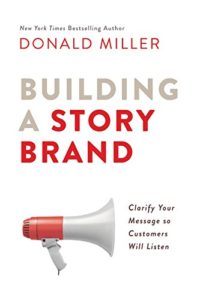
I’m curious. Are you familiar with this StoryBrand framework and his book, Building A StoryBrand?
Definitely. I know Donald Miller very well. I think his material is awesome. I have a high degree of respect for what they do.
I’m going through his book right now, the audio version. It’s great. It’s really good stuff. Listeners, definitely check out his book Building A StoryBrand and his podcast. So, the certification we talked about. What about live events? Because that can be really lucrative and it could be a huge value-add to the business, but it can also be a big drain on the business. It’s high stakes because you invest in the hotel, the catering, all the marketing, and everything to get the butts in the seats, and they don’t show up. It could cost you $100,000.
I’ve already disagreed with Michael Gerber, so maybe I can question some of your assumptions as well. I would say that most people have the impression that that’s what a live event has to cost or that’s what a live event should be, but that’s not the case at all. If you’re an entrepreneur listening to this, thinking of exploring live events, they are the most powerful, transformative way to get to know your customers and have high ticket offerings that are relevant to your customers’ needs. It truly is transformative in a business, but you’re far better off having it be a small event where you’re renting a conference room that seats 12 for a couple of hundred bucks, bring in lunch and dinner and do that for two days, reduce the cost of failure. Your first event should not be a bet of $100,000 on “Can I fill a ballroom in a hotel and fulfill the room night block in the F&B?” That’s the easiest way to make sure that you never do live events, lose a ton of money, and hate them forever.
I would be a much bigger proponent of what can you do in a workshop or boot camp format, that is extremely impactful and relevant for your users at a price point that would come with intimate and working side-by-side type experience, and play with it that way. Get to know your customers, grow your business, and continue to grow your list. Then, when you have your entire community clamoring for a large scale live event, do that. But for many of you, you might not ever need a large scale live event to hit your goals because your goals aren’t dictated by a large scale live event. Your goals are just, I want a profitable business that I can run, enjoy running, and you don’t have to have a live event full of tons of speakers to do that. You just need a business that meets those goals.
I love that. I was on the losing end of the spectrum by betting it all on a big live event, renting the ballroom. I pulled the plug at the last minute, the very last day where I could do that and get my money back from the hotel. That really set me back as far as wanting to do live events. It was a mindset thing where I just didn’t want to put myself out there again.
It’s been two or three years now since I tried to do that live event and I haven’t done another one, even a small one. I know the small logically, theoretically, totally makes sense. I should do a small workshop type of event. I’ve heard about Kevin Nations is all about that approach of lucrative, high ticket high-value small events, and haven’t pushed the button on that yet. I plan to within the next year.
There’s no doubt about it. Kevin Nations has applied that model brilliantly. I know a lot of individuals that credit his format to very significant success. That’s a great way of lowering the cost of failure.
Even with getting my money back from the hotel, it was still a $50,000 lesson.
I would avoid that at all possible. I’ve always felt that every $50,000 helps.
Lots of lessons. Oh my goodness. I’ve learned so many lessons in the last 27 years of being in business. I feel old now. By the way, how many years have you been in business?
In business as a whole going back to my first job or being in the marketing world?
Being an entrepreneur or business leader. How long have you been in that kind of position?
I’ve been in this industry for over a decade. Another of those 10 year overnight successes.
Exactly. Let’s talk about just for a minute, some of the other organizations, masterminds, and things that you’ve been a part of over the years. I know you mentioned GKIC earlier in our conversation. Love to get more of your thoughts on that. I actually had Dan Kennedy on this podcast. That was a fantastic interview; one of my favorites. Let’s first talk about GKIC and then we’ll talk about YPO and some of the other organizations. What are your thoughts and recommendations for our listeners regarding GKIC?
In what regard? I think GKIC and Dan Kennedy especially, and Bill Glazer who is sorely missed from the G in GKIC. They’re two of the most brilliant marketers on the planet. They’ve really done more to substantially increase the involvement of this business in many areas than anybody else by far. I don’t know anybody that has done more to popularize and legitimize this business.

That’s awesome. I’ve been on one GKIC event. Dan spoke at that event and it was great content that he was sharing. I just love his style, he’s so opinionated and curmudgeonly, but in a lovable way. His knowledge is just amazing.
Dan’s never going to answer any question with a maybe.
He’s incredible. You can get involved with him directly through his own masterminds. I don’t know if he still speaks at GKIC.
He does.
So he and Bill sold GKIC, but I don’t know the details around that and I’m not part of that community. I just went to one event a couple of years ago. I enjoyed it. I go to so many events, I have to really pick and choose where I spend time and where I fly to. Have you been to any GKIC events in the last few years?
Not really.
Okay, and when you were involved, when was that?
I came into GKIC immediately following them selling the company.
When was that?
That’s a great question. I have to go look at my LinkedIn profile. I’m gonna guess around 2011. Incredible group and information. The other mastermind that I would say is highly recommended is War Room, which is put on by DigitalMarketer.
Again, full disclosure, I’m totally biased. I was the CEO of DigitalMarketer for a year but their mastermind group is remarkable. One of the best gatherings, Roland Frazier, Ryan Deiss, Perry Belcher, and Richard Lindner. They’ve done an amazing job turning that into one of the most consistent and cutting-edge, especially for online marketers. It is the best in the business.
I got to attend one of the War Room meetings not too long ago. Roland had invited me. Actually had Roland on this podcast, too. That episode, listeners, well worth your time. Roland is brilliant. We shared so much stuff about masterminds and upleveling and upscaling through mentorship, masterminds, and so forth. Great content that episode. War Room is a great group and a great mastermind. I think it’s $30,000 a year now, so it’s not inexpensive. I opted at the time not to become part of War Room but I did join Genius Network. Do you have any experience with Genius Network and Joe Polish?
I do. I would absolutely say that Joe Polish is probably the individual I owe the biggest debt of gratitude in the industry. I’m in the industry because of Joe. Genius Network is, in its category, the best there is. I would say that DigitalMarketer’s War Room skews very heavy into the online marketing side. I think in Joe’s mastermind of Genius Network it’s a collection of a multitude of industry strategies. It is the very definition of a mastermind group facilitated by Joe who is probably the best-connected best facilitator in the world.
It’s a brilliant group, full of amazingly creative people in a myriad of different niches and what comes out of it is a pretty awesome thing. So, I can’t say enough good things about Joe. Also, they just did a movie about Joe called Connected, directed by Nick Nanton, that is going to be in limited release. If you would like to learn more about Joe, that is a great opportunity to see him, but hugely impactful group and mastermind.
I love it. I really enjoyed being part of the Genius Network. Now, you have been involved with YPO and that’s Young Presidents Organization. Is there a YEO as well or is it just EO? I’m not part of this world.
It’s now just EO and that’s Entrepreneurs Organization. The key difference between EO and YPO is company size. EO, you have to have a company that’s doing over $1 million a year. YPO, you have to have a company that’s doing over $15 million a year. YPO is a great organization, 25,000 members globally, and it is an audited organization. Anybody who comes in, you’ve got to have your financials reviewed and companies have to meet certain levels of qualification, but it’s another group of great individuals. I’ve often said that if I’m the smartest one in the room I need to find a different room.
Masterminds and YPO are all great ways to find people that are smarter, differently-abled, playing bigger, doing things that you really can’t help but expand your ideas of what’s possible, expand your ways of achieving it, and the individuals you had to bounce ideas off of. YPO has been transformational in my life. Huge win.
What would be an example of something that was transformational that you acquired, learned, or some breakthrough, some distinction that you got because of YPO?
I would certainly give credit to really the exposure to opportunities. I think we get very myopic in our views as entrepreneurs and before you know it—I think anybody listening who’s been in the digital marketing world will automatically relate to this—you begin to realize that your answer is always another sales funnel, campaign, coaching program, or consulting engagement. It gets to be very common in what you do and how you build businesses around it. What you find is when you go into a group like YPO, all of a sudden, you see businesses and get exposed to business models that you didn’t even know were businesses.
If you're waiting for the rest of your social circle to validate what you're doing, you're going to wait for a long time. Share on XIt’s really exciting to see what you can do when you begin applying and bringing together ideas from different industries because you might find an industry that is very profitable with very low competition because it’s unsexy and very few people know about it. You take what you know from the online world which is hyper-competitive, apply it in a less competitive environment, and you might have a formula for some pretty unbridled success.
So, that for me has been transformative of just getting exposed to completely different businesses and models that I was unfamiliar with, and didn’t even know that was a business that people were making a living from. That’s really what I would say has been most valuable.
I didn’t want to just apply this idea of exposing yourself to different kinds of businesses when you take on clients in the same exact vertical or niche all the time because you are the guy or gal in that industry. For example, I did a lot in retail in terms of SEO. Had a lot especially in that was known a speaker at shop.org, internet retailer IRCE and so forth. If I restricted myself to just those kinds of clients, then I get very myopic in my viewpoint and I wouldn’t be able to apply the stuff that I learned from working with some big, let’s say mainstream media, news portal, or let’s say I work with a big, at the time, video-sharing site that was competing with YouTube. Of course, then YouTube got bought by Google and game over after that.
I learned a lot, though, with those kinds of sites that were very heavy into user-generated content, very heavy into a community, and applying that to an eCommerce site because that’s so unusual. An eCommerce site is pretty boring and doesn’t have a whole lot of community to it. I totally resonate with what you’re saying about expose yourself to different kinds of businesses, different kinds of business models will help really enrich your thinking and what you deliver in terms of value out in the marketplace.
No doubt about it. It really will change and impact. Any business you’re in will be better served by you knowing about more businesses.
Since we got so much out of hearing about YPO and what you got out of that, I want to hear now what you got out of GKIC. What was the biggest transformational thing that happened because of GKIC?
I would say the biggest perspective shift and opportunity that came out of GKIC would just be an awareness that mail still works, that old media that everybody would like to pronounce dead is still succeeding and alive and well. But if you look at Dan’s broad base of experience, it really continues to show that if you’re switching anything and believing that a media is dead, it’s really not dead. It’s just that you’re not applying it correctly. There are companies today that are doing tens of millions, hundreds of millions of dollars using just mail, you know this weird paper thing that shows up in your box outside that nobody goes to check anymore. It’s so interesting when you then begin looking at all the case studies around what Dan presents of the role that mail plays, it’s something that if I had not spent time at GKIC, I would be one of those individuals who continue to say that direct mail is dead.
One of the things that we at Kajabi are doing that is really cool is we actually mail out a ‘Welcome to Kajabi’ brochure as soon as you join, literally in the mail. We’re as anti-mail as it gets. We’re a software platform that provides online marketing, and we’re sending out mail. I would just say that GKIC really shows that it’s definitely not the method, it’s the marketer, and there are lots of underserved opportunities in areas that people right now view as not sexy.
Couldn’t agree more. I was so impressed with what I learned about direct mail from Dan Kennedy and GKIC. For example, the Shock and Awe Box which I had never heard of before, that was a mind-bending and mind-expanding insight. I actually saw one of the GKIC students who had his Shock and Awe Box with him. It had a copy of his book in there, it had all these different things, and all together, it was really impressive. He is a specialist in how to either import or export out of Mexico. I forget which one. He had a book on the topic, he had all these different things that were in the Shock and Awe Box.
You’re thinking of Sandro Piancone. He launched that business while he was at GKIC. Massive success stories, super awesome guy and amazing business. I’ve been down to visit them many times.
That’s such a small world. One other thing I learned from Dan was the power of the lumpy out envelope. Before hearing this distinction, I never really thought about it, but I certainly was more intrigued when I got something in the mail that felt lumpy or it felt like there was something more than just paper in the package. Somehow intuitively, I knew this from the past because I applied this idea to sending out to hot prospects.
When I had my previous agency, Netconcepts, we would send these FedEx tubes in the mail. They would include a pair of men’s wool hunting socks because we helped Cabela’s, our client at the time ranked number one for hunting socks, wool hunting socks, men’s hunting socks, all these different permutations. We had a cover letter that reference that, so it made sense why they got some wool hunting socks in the mail. Everybody who received that FedEx tube would open that thing.
Absolutely. It’s very much something that really does a lot of really cool things. When you can get the intrigue and excitement of, “I’m opening this because I just got to know what’s inside.”
What’s Kajabi sending in the mail that intrigues people to open it up? You send out a brochure, as soon as somebody joins or signs up for Kajabi. What is it that makes them want to open that up? What do you send as a follow-up piece in the mail, or to hot prospects that intrigues them or makes them curious?
For us, it’s just really showing up in an unexpected place. You wouldn’t expect this to show up in your mailbox, so we’re gonna say hi.
Do you also show up unexpectedly by sending video from the, let’s say, customer success manager or whatever? I forgot which email platform does this. Oh, I know. It’s ConvertKit. When you sign up for ConvertKit, they would almost immediately send you a Bonjoro video from the customer success manager saying, “Hey, welcome, great to have you in…,” actually using the person’s name. It was an individual video, maybe a minute long sent to the new customer. It’s really cool and helps establish that personal connection definitely differentiates you. You’re doing anything like that at Kajabi?

I’m not sure how I would answer that. We’re doing a lot of things to differentiate ourselves, no doubt about it. But I think for us, it’s differentiation with a purpose. We’re not in this just to be funny. We’re in this really for measuring our customer success because that’s really where we derive most of our excitement, in their journey and what they’re able to achieve. I would just say that we’re going to differentiate as much as it is effective. It’s not necessarily that we’re differentiated for differentiation’s sake.
There are lots of people out there that I think would say, “Oh, I’m doing this to be different.” “Yeah, but is it working? Is it driving the end result or are you just being the weird, different guy?” Certainly, some of the people that, for me, they attend events and they dress in really weird, loud, crazy clothing, and it’s like, “All right, I get that you’re differentiated and I get that you’re getting attention, but is the attention you want serving the overall purpose?”
I think that’s called peacocking, at least in the pick-up world. One thing that you mentioned early on in the interview was this idea of a Kajabi superhero, who’s made seven figures off the platform. That’s a differentiator with a purpose.
One of our favorites and probably biggest sources of pride is our Kajabi Hero Program. We have an amazing recognition program at Kajabi for our users, that as they achieve success and grow on the platform, we celebrate with them. With each level of success you achieve on Kajabi, we have different prizes, exciting things that we actually send you, that are different for every level of success. You can only earn them. They’re not available for purchase. It really is our way of just getting to celebrate our users for their successes.
We also have a very active partner program of people that refer to Kajabi that has a rewards program all of its own, in addition to industry-leading commissions. It’s something that recognizing our customers and their success, and then encouraging them to refer to us in cool ways, is a huge part of what we do.
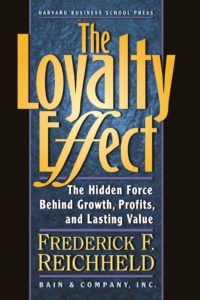
Very cool. Now, there’s a whole discipline to loyalty programs or a whole kind of curriculum. It’s deep. There are whole books on the topic. I forget who offered it, but the Loyalty Effect is a pretty famous book in that space. Who wrote that? Oh, Frederick Reichheld.
It’s certainly something that, for those of you listening, we didn’t read any books. We didn’t make a study of it. We just basically said, how would we like to be treated if we were in that position and did it from there. So, don’t overthink it.
Just do it, right? What is it, imperfect action? The enemy of done is perfect.
That is absolutely true. So, yeah. Get out there, try some stuff. Find some cool ways to differentiate yourself. Show up in places you haven’t shown up before. Find ways to reward, engage, and excite your customers. It’s really all there for the taking.
I always remember Tony Robbins. It was at an event with Tony and it was when I was working with Chet Holmes and Tony Robbins in Business Breakthrough Consulting. Tony just had a really impactful moment where someone was sharing their frustration with their business. He just said to Tony, “You got to understand. I’ve tried everything and it’s still not working,” and Tony was like, “Really, you’ve tried everything.” The guy is like, “Yeah,” and he’s like, “All right. What have you tried?” He’s like, “Well, I sent out some mailers.” “Okay, what else?” “Well, we have someone answering the phone.” “Okay, what else?” and just long silence. Tony looks at him and it’s like, “So, you haven’t really tried everything, have you?
This is another one. I’ll give the nod to Dan Kennedy, where everybody wants to talk about, “Oh, retail’s dying and nobody can make any money in retail anymore.” What do you really do find is it’s not that anything’s dying, it’s just that the people applying it have gotten lazy. I’m sure everybody on this phone call can relate to times when you walk into a store and you can’t even get help because the person is too busy texting on her phone to even look up and try and sell you something.
I think we are also easily apt to assign the lack of results, or the lack of success, or the lack of whatever it is we’re trying to create, to circumstances beyond our control, when in all sincerity, the basics are still there and the basics are just not being really driven the way that they could be driven, that if every sales clerk in a retail store was professional, courteous, and totally knocking it out of the park for everybody that walked into that store, I’m pretty confident that store is going to succeed no matter how well Amazon does.
But that’s not really where we look. We just look to the, “Oh, I want to have an automated webinar that drive sales,” and it’s like, “Well, I know lots of people would have that,” but you got to talk to your customers first like, “Oh, I don’t want to do that. I just want an automated webinar and drive sales.” Well, I can tell you this much. If you’re not getting on the phone and talking to your customers, you’re gonna have a real hard time selling them in an automated fashion.
Yeah. I’m curious. Since you brought up Tony Robbins, what’s been the biggest impact that he’s made on your life? He’s made massive impacts on my life. I’m married to the woman of my dreams because of him. I actually met her at a Tony Robbins event at Date With Destiny. But the physical transformation I went through, I’m literally unrecognizable from the previous version of who I was, prior to going to my first Tony Robbins event, Unleash the Power Within. Do you have some sort of transformational story like that?
I really don’t and I’m sorry to be anti-climactic, but my experience with Tony was very different. I had been working with Chet Holmes in Business Breakthrough Consulting and we did the first business event Tony had ever done called Ultimate Business Mastery Summit in Las Vegas, which is now Tony’s Business Mastery Seminar. He acquired Business Breakthrough Consulting from Chet Holmes. My experience with Tony was very much on the business building side.
What I will say I appreciate about Tony is you’ll meet a lot of people in this industry. One of the things that Tony is, he is fully integrated and committed to what he teaches. When Tony is taking the room through an exercise, It’s an exercise that he himself is likely doing in the back of the room or has done in the past multiple times. He is definitely not a ‘I’m selling it.’ He is definitely an ‘I’m living it.’
If you believe that a media is dead, it's really not dead. It's just that you're not applying it correctly. Share on XIt’s certainly something that like him, hate him, love his content, hate his content, the one thing you can’t take away from him is he is absolutely 100% a believer in the content that he is teaching. That’s something that I really do appreciate about him. He’s also probably one of the most focused and intentional people I’ve ever met.
Tony maximizes every moment of every day because he has so few moments. When you’re with him and you see his ability to bring his absolute best that fast, you never show up to a meeting and fill it with ineffective pleasantries. It’s going from the moment. It’s really one of those things that just really models that intentionality and something where, when you have very little time and you’re looking at your results, if you audit your day in five minute blocks and see what you’re actually spending your time on, you’ll realize just how much time you actually have.
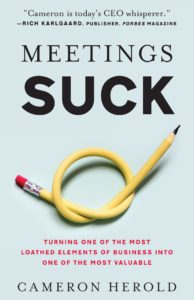
There are so many meetings that are just an utter waste of time. There’s no agenda. In fact, I think Cameron Herold mentioned and when I interviewed him—that’s where he wrote the book Meetings Suck—he said that if it’s a meeting that has no agenda, he walks right out. I just imagined Tony doing that too like, “What? No agenda? I’m out of here.”
We have just a few minutes left. I would love to hear a little bit about your personal passions and how you’re applying the idea of digital education entrepreneurship in your life or within your family. Do you have either your own digital education thing going on in the background or on the side?
I wish I had the time to have one. I’d love to start one and at Kajabi, we’re actually very encouraging of people having them, but I’m too busy running the company with Kenny.
What about your kids, or your spouse, or your siblings, or best friends, or anything like that? Have you encouraged them to follow their personal passions and turn that into a digital education business?
Only all the time, but you got to know and I’m sure, Stephan, you know this too, a prophet is never accepted in his homeland. It’s one of those things for me, I would say when I first got into this industry, I would proselytize like crazy. “Man. Go. Go out there. Get it. Do it. Look at what’s out there. Look at what you can do.” Then, after having lots and lots of friends ask me for the same advice over and over and over again and having none of them take action on it, I just don’t give advice anymore.
If somebody asks and then takes action, I’m happy to help them after that. I definitely have gotten out of the mode of leading a horse to water. For those of you that are listening—I think this is a great takeaway and maybe a little bit of a nice opportunity to end on—really, if you’re waiting for the rest of your social circle to validate what you’re doing or to believe in it, you’re going to be waiting a long, long, long time.
The one thing that everybody will understand is, once you’re successful in it, then they’re all going to ask you how you did it. But let me also let you know that when they ask you how you did it, it still doesn’t increase the likelihood that they’re going to do it. It’s more just, they’re looking for a reason to tell you why you are lucky or to tell you why you are in the right place at the right time because what they’re really looking for is justification that they don’t need to change what they’re doing.
Model rather than preach and when you model, don’t expect them to take up the mantle and do it. They’re potentially just looking for holes to poke at and not necessarily to run with their own ideas. Although, there is the rare occasion where somebody will be inspired by your modeling. For example, my oldest daughter, Chloe, saw that I was making passive income with Google AdSense many years ago. I had a bed and breakfast directory called Insight and authors a community called writers.net. She’s like, “You’re making thousands of dollars a month without doing anything with these websites. I want to do that.” She meant it. She was actually going to follow through and she did.
She created—again, around her personal passion—a website and blog dedicated to Neopets, which at the time was a very popular website with tens of millions of users, and she ended up on page one for Neopets. It took a while and she had to do stuff like speak at conferences and so forth as a teenager, to really build up her brand, get all the links and everything that helped jettison her to page one. To this day is something that completely changed her life. She’s now an SEO consultant because of that. She was 14 at the time she started and she’s 28 now, so pretty cool.
I wholeheartedly agree. I hope that my earlier diatribe doesn’t make me sound jaded because that’s certainly not its intent. It’s more than just the understanding, the big differentiator is that she sought you out and she was ready to take the action, whereas so many of us are hamstrung from what we could achieve because we’re still looking for that magic bullet. We’re hoping that somebody tells us something that changes everything when you will learn so much more by action and implementation than you will any other way.
It’s one of the reasons why at Kajabi, we have worked so diligently and have expanded our resources and team so much to do everything possible to remove technology from the business journey, so that you can truly focus on what’s going to make the biggest difference in your business, which is the marketing, copywriting, content, thought leadership, and all of the things that you should be spending your time on, not spending your time shopping for marketing automation processes or how to connect 35 systems into something, but just really focusing on the true levers that drive success.
The enemy of done is perfect. Share on XCouldn’t agree more. Perfect. Great way to end this. Again, what’s the website for folks who are interested in learning more about Kajabi?
Thanks for asking, Stephan. Just head over to www.kajabi.com. You can take a look at everything we’ve got out there. We’ve got a couple of unique opportunities to take advantage of. One of them is our 28 Day Challenge, which actually doubles your 14-day trial to 28 days of full use of the platform with an email coaching program that is designed to help you concept, market, and sell your first product in under 28 days before your subscription is ever due for rebilling. Imagine being able to jump in, get coached on defining your concept, producing it, marketing it, and selling it in only 28 days. That’s the path we’d love to take you down.
Nice. Thank you so much, JCron, really appreciate you sharing your insights, experiences, and wisdom. This has been a lot of fun and highly valuable to our listeners. Listeners go check out kajabi.com, sign up for the 28 Day Challenge, and become a digital education entrepreneur. This is Stephan Spencer, your host, signing off. We’ll catch you on the next episode of Marketing Speak next week.
Important Links
- Jonathan Cronstedt
- LinkedIn – Jonathan Cronstedt
- Twitter – Jonathan Cronstedt
- Kajabi
- Kajabi Hero Program
- Michael Gerber – previous episode
- Roland Frazier – previous episode
- The E-Myth
- The Art of SEO
- Building A StoryBrand
- Loyalty Effect
- Meetings Suck
- Success Magazine
- DigitalMarketer
- Andy Jenkins
- Kenny Rueter
- Shopify
- Greg Todd
- Chanel
- Volvo
- Sony
- Joe Schmo
- Donald Miller
- Building A StoryBrand Podcast
- Kevin Nations
- Dan Kennedy
- GKIC
- YPO
- Bill Glazer
- War Room
- Roland Frazier
- Ryan Deiss
- Perry Belcher
- Richard Lindner
- Genius Network
- Joe Polish
- Connected
- Nick Nanton
- Entrepreneurs Organization
- Shop.org
- IRCE
- Shock and Awe Box
- Sandro Piancone
- Netconcepts
- FedEx
- Cabela’s
- ConvertKit
- Frederick Reichheld
- Tony Robbins
- Chet Holmes
- Amazon
- Date With Destiny
- Unleash the Power Within
- Business Mastery Seminar
- Cameron Herold
- Google AdSense
- Writers.net
- Neopets
Your Checklist of Actions to Take










About Jonathan Cronstedt
 Jonathan Cronstedt, also known as JCron, is an investor, advisor and author. JCron is a Board Director at Kajabi, a knowledge commerce platform. Prior to Kajabi where he was president from 2016 to 2021, JCron held executive leadership positions for SaaS, mortgage finance, digital publishing, and direct sales. Jonathan has also served as the CEO of Digital Marketer and is currently a Managing Partner with APEX Equity.
Jonathan Cronstedt, also known as JCron, is an investor, advisor and author. JCron is a Board Director at Kajabi, a knowledge commerce platform. Prior to Kajabi where he was president from 2016 to 2021, JCron held executive leadership positions for SaaS, mortgage finance, digital publishing, and direct sales. Jonathan has also served as the CEO of Digital Marketer and is currently a Managing Partner with APEX Equity.







Leave a Reply